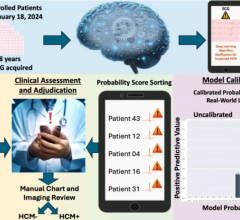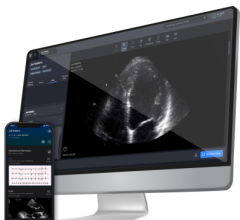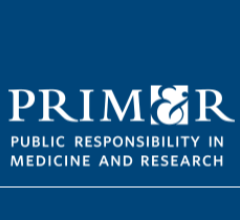
Image courtesy of iStock
August 29, 2019 – In the near future, doctors may be able to apply artificial intelligence (AI) to electrocardiogram data in order to measure overall health status, according to new research. The study was published in Circulation: Arrhythmia and Electrophysiology, a journal of the American Heart Association.1
An electrocardiogram, also known as an EKG or ECG, is a test used to measure the electrical activity of the heart. While it’s known that a patient’s sex and age could affect an EKG, researchers hypothesized that AI could determine a patient’s gender and estimate their ’physiologic age’ — a measure of overall body function and health status distinct from chronological age.
Using EKG data of almost 500,000 patients, a type of AI known as a convolutional neural network was trained to find similarities among the input and output data. Once trained, the neural network was tested for accuracy on the data of an additional 275,000 patients by predicting the output when only given input data.
The neural network estimated a patient’s chronological age as higher after experiencing adverse health situations such as heart attack, low ejection fraction and coronary artery disease, and lower age if they experienced few or no adverse events.
“While physicians already consider whether a patient ‘appears [their] stated age’ as part of their baseline physical examination, the ability to more objectively and consistently assess this may impact healthcare on multiple levels,” said study author Suraj Kapa, M.D., assistant professor of medicine and director for augmented and virtual reality innovation at Mayo Clinic in Rochester, Minnesota.
“Being able to more accurately assess overall health status may help doctors determine which patients they should examine further to determine if there are asymptomatic or currently silent diseases that could benefit from early diagnosis and intervention. For people at large, an AI-enhanced electrocardiogram could better show there may be something going on such as a new health issue or comorbid condition that they were otherwise unaware of,” continued Kapa.
Researchers discovered that the artificial intelligence was able to accurately determine a patient’s gender 90 percent of the time and could determine the chronological age group of a patient with 72 percent accuracy.
“This evidence — that we might be gleaning some sort of ‘physiologic age’ — was certainly both surprising and exciting for its potential role in future outcomes research, and may foster a new area of science where we seek to better understand the biologic underpinnings of such a finding,” Kapa said.
While the study was able to draw from a large sample size, all individuals in the study were patients, and EKGs were administered for another clinical indication. Future studies with an overtly healthy population are needed to revalidate the neural network’s determination. Additionally, gender in the study was self-identified by patients and may not represent the sex of all individuals in the study.
For more information: www.ahajournals.org › journal › circep
Reference
1. Attia Z.I., Friedman P.A., Noseworthy P.A., et al. Age and Sex Estimation Using Artificial Intelligence From Standard 12-Lead ECGs. Circulation: Arrhythmia and Electrophysiology, published online Aug. 27, 2019. https://doi.org/10.1161/CIRCEP.119.007284


 September 24, 2025
September 24, 2025 









